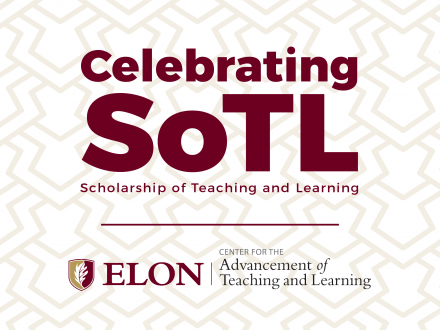Today we feature a story on an Elon University Assistant Professor of Economics, Dr. Brooks Depro, who sought to answer how to make coursework more relevant to his students. The work he has done was recently published in an article title: “Making introductory economics more relevant: Using personalized connections to introduce environmental economics”. You can read more about his story and SoTL process below.
Each spring, the Center for Engaged Learning (CEL), the Center for the Advancement of Teaching and Learning (CATL), and the Center for Research on Global Engagement (CRGE) join together to showcase research projects focused on the Scholarship of Teaching and Learning (SoTL). Follow along this week as we share Elon scholars’ research on innovative teaching practices through a series of Today at Elon articles.
With a myriad of technologies, methodologies, pedagogies and other Scholarship of Teaching and Learning (SoTL) resources available, Elon faculty often seek and incorporate real-life examples into their classroom to engage their students while also giving them practice with knowledge and skills applicable to employment opportunities students may encounter after graduating.
The practice of using real-life examples in the classroom has been around for decades, so why do we continue to see students who perceive content and materials as not relevant for their lives? This is the type of question Assistant Professor of Economics Brooks Depro, sought to answer through a SoTL project during the last few years focused on an Introductory Economics course that resulted in his recently published article titled, “Making introductory economics more relevant: Using personalized connections to introduce environmental economics”.
When he started teaching full time at Elon in 2017, Depro brought more than 20 years of professional experience consulting in the environmental economics industry including research on the economics of environmental justice. He wanted to merge his extensive background and knowledge of real-world experiences in environmental economics with what he was teaching, learning and researching in the classroom.
“As part of my research goals, I wanted to have traditional research like what I was doing in the consulting industry, but I also wanted research related to how I was learning in the classroom and sharing ideas with other people and how to do that formally,” Depro says.
Depro was able to provide many real-world applications of environmental economics in his courses through different assignments but wanted to find out how students perceived these examples and if they understood their applicability. He started this inquiry process by reaching out to the Center of Advancement of Teaching and Learning (CATL) and taking advantage of their Mid-Semester Focus Groups (MSFGs):
“I’ve used CATL’s Mid-Semester Focus Groups, and many times, I’ll get feedback related to the entire class and these specific assignments,” Depro says. “So, I pay attention to those things. And, now that I’ve done those MSFGs a couple of times, I now do my own kind of mid-semester feedback questions…knowing what the benefits are and the suggestions that come from asking the question – like tweaking the course at mid-semester if need be. This is something I always do now, I make small adjustments after receiving feedback from students, and they appreciate that, and it’s helped with course design.”
This program isn’t the only influence Depro attributes to effectively designing relatable assignments and engaging students. He notes a variety of experiences that contributed to his teaching over the past several years, including: being able to participate in a pilot clicker program as an adjunct using the Think/Share/Pair model through CATL and Teaching and Learning Technologies (TLT); working with the Center for Writing Excellence as a Disciplinary Writing Consultant; being on a team that was award a CATL Diversity, Equity, and Inclusion Grant (DIG); and work with his department, the Department of Economics in the Martha & Spencer Love School of Business.
“I tried a new specification grading guideline this semester and got some good suggestions that helped me develop this pilot that I’m doing,” Depro says, giving a special shout-out to consultations with the CATL team. “So that’s great –you can send an email, and the team is very responsive, providing a lot of good ideas that I can read and independently decide what I need to do.”
After several iterations of researching, testing and adjustments based on student feedback, Depro developed an assignment that worked well in his economics course and could work well for not only other economics professors but professors in other disciplines as well. This is when Depro decided to participate in CATL’s summer Writing Residency, which allowed him to take what he had done in the class and put it on paper to formally talk about his three-module assignment design:
 “I would never have thought that I would get a journal article idea out of these three ideas that I’ve been working on,” Depro says. “But, getting the ideas written down on paper helps. The journal article and some of my other SoTL work that I’m doing with Katy Rouse were motivated by the summer writing residency program with CATL. It emphasized getting writing done and working in teams and in writing groups…with the key benefit of the program being the encouragement to get into a writing group, having reviewers and that process that includes other people outside the economics department, and getting feedback on the paper before submitting it.”
“I would never have thought that I would get a journal article idea out of these three ideas that I’ve been working on,” Depro says. “But, getting the ideas written down on paper helps. The journal article and some of my other SoTL work that I’m doing with Katy Rouse were motivated by the summer writing residency program with CATL. It emphasized getting writing done and working in teams and in writing groups…with the key benefit of the program being the encouragement to get into a writing group, having reviewers and that process that includes other people outside the economics department, and getting feedback on the paper before submitting it.”
Depro’s SoTL article, “Making introductory economics more relevant: Using personalized connections to introduce environmental economics,” contains many great ideas on how to develop assignments. In the first of three modules described in this article, Depro provides “context-rich problem design” that aims to help students make a personal connection to the material. The second and third modules described help students engage with the material and consider the ethics behind different real-world decisions. He concludes the article with supplementary materials and tips for instructors wishing to use one or more of the modules in their class.
When asked what advice Depro would give to other faculty who might want to try to do SoTL work, work on their assignments, or perhaps try to get their work published.
“It takes your own initiative. CATL [and other faculty development supports on campus] broadcast many great opportunities,” Depro says. “Still, it is very easy to let the semester flow prevent you from taking advantage of opportunities. What I usually do at the beginning of each semester is take a look at the list of ideas and force myself to at least pick one idea to either participate in or think about during the year for my annual review, which has been a pretty good commitment device…that and getting it written down on paper. The published paper and one currently under review were developed over multiple years – it’s not like they magically appeared. Rather, they were built over time and gave me time to reflect on what worked and what didn’t for each module. It takes a long process of tweaking and getting feedback to get them to work well in the classroom.”
SoTL benefits current and future faculty within and across disciples alike. If you are interested in learning more about the Center for Advancement of Teaching and Learning’s programs or to talk with a CATL faculty member about designing, implementing, or deepening a SoTL project, you can visit their site online at https://www.elon.edu/u/academics/catl/ or email them at catl@elon.edu with questions.
Recently published work by Brooks Depro cited in this article:
A second article developed during the CATL’s summer Writing Residency is currently under review.


